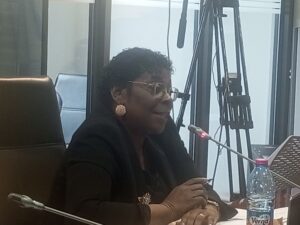Supreme Court nominee advocates digitisation of Ghana’s judicial system

Justice Sophia Rosseta Bernasko Essah, a Court of Appeal Judge and a Nominee of the Supreme Court, has advocated the digitisation of Ghana’s Judicial System as part of efforts to increase efficiency in justice delivery.
She made the recommendation during her vetting at the public sitting of the Appointments Committee of Parliament at Parliament House in Accra.
“Given the issues, which arise as a result of the lack of digitisation, it will be important that as much as possible, we digitize the whole judicial Justice Delivery System in all aspects to reduce the face to face or interface between litigants, parties and members of the Judiciary and the Judicial Service,” she stated.
“Some work has been done and there is still more work, that is extensive.
Honourable Chair, I will also say that as much as possible, we set up many law courts, many have been set up by the Chief Justices in the recent past, but we do need more in order to reduce incidence of delays in adjudication.”
The Nominee noted that in her view as a Judge, there was the need to step up ADR as a form of resolving conflicts and disputes between parties.
“It is very effective, and it is less expensive, it is done in an informal environment, and it is generally a win-win situation.”
Justice Essah reiterated that many litigants and sometimes lawyers were not eager to have their grievances addressed through ADR but that was what they needed to do as Judiciary to encourage the adoption of ADR as a means of resolving disputes.
“Honourable Chair, I will also say that we need to also increase transparency in the work we do….Maybe because law is in English, a lot of people who may not be very conversant with English and legal words find themselves excluded from exactly what goes on and when it is shrouded in lack of understanding they are not comfortable with the outcome,” she said.
She suggested that the Judiciary needed to do a lot of sensitisation about what they do and how they go about it.
Justice Essah also advocated the need for the use of law clerks to assist Supreme Court Judges in their work.
A law clerk is a person, often a lawyer, who provides direct counsel and assistance to a lawyer or judge by researching issues and drafting legal opinions for cases before the court.
Prior to the beginning of the vetting process, Mr Mahama Ayariga, the National Democratic Congress (NDC) Member of Parliament (MP) for Bawku Central, moved a motion to express a concern about the President’s authority to nominate more than 10 Supreme Court judges.
The 1992 Constitution of Ghana per Article 128(1) states that “The Supreme court shall consist of the Chief Justice and not less than nine other Justices of the Supreme Court”.
Mr Ayariga’s Motion led to a heated debate between the New Patriotic Party (NPP) Majority and the NDC Minority Members of the Committee, which resulted in the suspension of the Committee’s sitting for close to 40 minutes.
Upon resumption, Mrs Patricia Appiagyei, the Vice Chairperson of the Appointments Committee, presiding, granted a request by Mr Ayariga for a vote on the Motion.
The result of the vote tally was seven in favour and seven against, hence, the Motion was lost, paving the way for the vetting to begin.
Source: GNA
